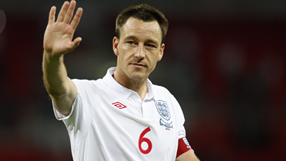
The 31-year-old, capped 78 times since his debut in 2003 and who appeared at two World Cups, issued a statement saying his position in the national team had become untenable due to the Football Association's impending case against him.
Terry is due before an FA tribunal on Monday facing charges of racially abusing Queens Park Rangers defender Anton Ferdinand during a Premier League game last October despite being acquitted in the law courts in July.
"I am today announcing my retirement from international football," the former England captain said in his statement.
"I would like to thank the England managers who have selected me for my 78 caps.
"I have had great pleasure in sharing that honour with all the players that I've played with. I would like to thank them, the fans and my family for their support and encouragement during my international career.
"Representing and captaining my country is what I dreamed of as a boy and it has been a truly great honour. I have always given my all and it breaks my heart to make this decision."
Terry, who if found guilty of racially abusing Ferdinand could face a lengthy ban similar to the one served by Liverpool's Luis Suarez last season, said the FA had left him in an impossible position.
The best features, fun and footballing quizzes, straight to your inbox every week.
"I am making this statement today in advance of the hearing of the FA disciplinary charge because I feel The FA, in pursuing charges against me where I have already been cleared in a court of law, have made my position with the national team untenable," Terry, whose last cap was in the recent World Cup qualifier in Moldova earlier this month, said.
East-London born Terry has spent his entire career with Chelsea since joining as a 14-year-old.
RUGGED, FEARLESS
He made his first-team debut in 1998 and quickly established himself as one of the country's best central defenders, rugged and fearless but also possessing the ability to play the ball from the back.
His first England cap came against Serbia and Montenegro in 2003 and he was selected for the Euro 2004 finals in Portugal.
Terry's leadership qualities persuaded former England manager Steve McClaren to give him the captain's armband after David Beckham gave up the position following the 2006 World Cup.
It was a role he took on with pride, although his England captaincy was not without its problems.
The Chelsea stalwart, who regularly put his body on the line for his country, had the armband taken away by Fabio Capello in 2010 after revelations about his private life.
Terry courted controversy at the World Cup finals in South Africa when he hinted that the players were bored at the team's base and that had held clear-the-air meetings with Capello.
After regaining the position due to Rio Ferdinand's injury problems he was again stripped of the captaincy in February over the Anton Ferdinand allegations, a decision that led Capello to quit.
Terry's decision will be a blow to England boss Roy Hodgson who publicly backed him despite the ongoing controversy.
 Join The Club
Join The Club





